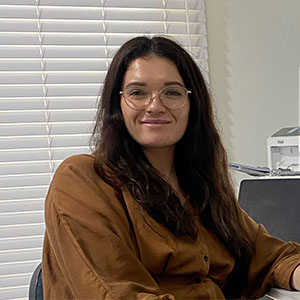Kerby Siemson
From shearing to the Army, via Magnetic Island
 Kerby Siemsen
Kerby Siemsen
On tropical Magnetic Island, in far north Queensland, UNE alumna Dr Kerby Siemsen has been largely insulated from the heartache wrought by COVID-19 this year. Providing welcome continuity of care to the island’s 2500-strong permanent population and tourists blissfully free of lockdowns has fully engaged the young doctor.
But the global pandemic has provided valuable lessons nonetheless, especially on how culturally appropriate health messages and medical care can best be delivered, and what her future career might hold. Watching the outbreak spread in remote Indigenous communities in western NSW – where, in Wilcannia, about 10% of the population is now infected – Kerby says she’s been disappointed to see blanket restrictions deny basic human needs.
“We all need to pull our socks up to ensure that the disadvantaged in remote communities get all the support they need,” Kerby says. “Culturally appropriate care is vitally important, recognising that culture varies between nations of Aboriginal and Torres Strait Islanders. It’s about being practical and using common sense, thinking about what’s available in the area, the social situations and getting to know peoples’ needs. If you can do that, you can provide care to anyone, whether they are black, white or brindle.”
Since graduating in 2018, as only the second Indigenous student from UNE’s School of Rural Medicine, Kerby has spent time becoming familiar with a number of different communities. First she went to work in a GP practice in Warialda, before completing her junior doctor training in Wagga Wagga. As an Australian Army Trainee Medical Officer, she will next year begin her four-year return of service.
“It’s a unique opportunity,” Kerby says. “I will do my basic training, military courses and then work in the head Army clinic in Townsville, while also hopefully continuing some civilian work. There are also opportunities to go out on exercises to offer medical support or on national and overseas deployments. My GP work has been great preparation for the primary, day-to-day health care I’ll be delivering to Army personnel.”
It has certainly been an inspiring trajectory for someone who dropped out of Year 11 and was working in a shearing shed when she decided to undertake a TAFE preparation course to gain university entry.
“I love Armidale, and UNE is the best,” Kerby says. “I had a lot of passionate lecturers and doctor mentors throughout the program. They knew you and you knew them; it was that much more personal, and because of that they gave you great medical experiences. I was exposed to many things a lot earlier.”
The variety that GP work offers is what Kerby finds so appealing now. “I love doing all sorts of different things each day, and getting my hands dirty,” she says. “That’s what keeps drawing me back to general practice rather than any other specialty.
“I feel I have a strong sense of community spirit and I love getting to know people, seeing them down the street and having them say ‘Hello doc’. I really like that.”
The people of Magnetic Island, many of them retirees, have certainly appreciated a constant, familiar face. Every work day Kerby makes the 25-minute ferry ride to the island from Townsville, where she has made her home – along with her two horses.
“They’ve come with me everywhere, just like dogs,” says Kerby, who is about to hand over the reins as secretary of the Wagga Dressage Club, a position she has maintained via Zoom since leaving the district. “It took the horses five days to travel up from Wagga, but they are very much a part of who I am and I wouldn’t be without them.”
Kerby is thrilled to see the number of Indigenous medical students growing at UNE.
“Often a person who identifies as Aboriginal or Torres Strait Islander will say they are not smart enough to study medicine at university,” she says. “I tell them about where I came from and how I did it; I hope that inspires them a little bit. I look forward to the time when it’s normal to be seen by a doctor who is Indigenous. That’s when we will have truly made it.”
As for the future, Kerby says the COVID pandemic will undoubtedly herald change in health care.
“COVID has made people more aware of and more appreciative of their health,” she says. “I think we will soon begin to see people who we might not otherwise have seen coming through the doors, and be able to offer them preventative health care. I think we will also see more Telehealth delivered, provided the government recognises the Medicare gap and funds us sufficiently.
“Hopefully more people will also be inspired to join the healthcare workforce, because we have this new appreciation for our frontline workers.”

